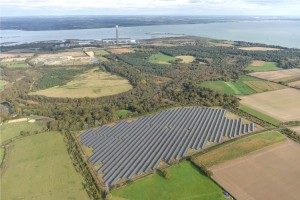One of the most interesting presentations at this year's Solar Energy U.K. show that concluded Thursday in Birmingham was about the “Sunshine Tarriff” project in the South West England county of Cornwall.
Tamar Bourne, of the South West Renewable Energy Agency (Regen SW), an independent, non-profit organization, told the audience that grid capacity in South West England is currently exceeded, prohibiting the expansion of renewable energies. “In the last six months, we found that any connection for distributed generation will face a delay between three to six years,” Bourne said.
The community of Wadebridge and surrounding villages in Cornwall, however, have organized the Wadebridge Renewable Energy Network (WREN), which is making strides in promoting renewable energy in the area, Bourne explained. The network's more than a thousand members are rolling out many micro-installations, mainly solar PV, and the area is among the country's top destinations for solar PV installations.
WREN is seeking to make it operating region go 100% green and is looking to build a large-scale solar PV farm. The network's members initially decided to build a 5 MW ground-mounted project, found the site and the funds, but due to the grid's thermal and voltage constraints in their area, they were told to reduce their plans down to about 500 kW. They changed the business model and tried again, only to have the distributed grid operator of their area tell them they could only go ahead with a 100 kW farm, and eventually that they could not proceed with it at all due to grid constraints. The uphill effort has taken the community about four years and £15,000 to £20,000 in consultancy and other planning fees.
Offset connection: The trial
The only solution to the problem would be to change the relationship between power generation and consumption. Thus, the community is now trying to shift the power demand pattern and incentivize daytime power consumption so that the generated power from the solar farm is consumed when generated and not needed to be exported via the grid.
The traditional way of connecting a PV farm to the grid is via timed connection, said Matthew Watson, an engineer at local DNO Western Power Distribution. In this case, PV power generation is often curtailed due to power constraints. Eventually, if the curtailment is very frequent, the business case for the project is not viable.
The alternative to this is the so-called “offset connection,” whereby PV power generation in the distribution grid is only curtailed when it's not offset. In other words, “if you can absorb extra generation locally then there will be no net effect on constraints at higher voltage levels,” Watson said. Hence, the idea for a “sunshine tariff” that incentivizes customers to use more electricity during daytime.
Popular content
The community decided to carry out a trial in partnership with the DNO, Regen SW and local utility Tempus Energy. The results derived from the project's trial are vital for its implementation.
Specifically, Bourne said, “We are looking to learn if an offset connection agreement can be commercially viable for the generator; how an offset connection agreement needs to be structured to provide confidence to the DNO; what mix of low tariff, behavioral signals and technology options would be most effective in shifting demand; and what scale, longevity and reliability of demand side response would be achieved by the most effective method.”
In order for such a project to be implemented successfully, a company or group of companies with vested interests in the area will likely be needed, Bourne said. Moreover, independent of the findings, the proposed sunshine tariff could also make sense without the offset connection. Such a tariff could relieve the grid from existing constraints.
U.K. solar: Cooperate and innovate to survive
Beyond the specifics of the Wadebridge project in Cornwall, the trial is significant and a strong indicator for what could happen in the U.K. solar PV sector. The Solar Energy UK conference made it clear that the government decided to abandon solar three to four years before solar technology reaches grid parity and can compete with other power sources on a level playing field.
Britain's solar businesses are now preparing for the rationalization and consolidation of the sector, while the U.K. PV market's ground-mounted segment in particular is expected to shrink drastically.
One solution, most presentations suggested, would be the emergence of new business models and innovative ideas to build PV. Rob Shaw, of London-based LDA Consultancy, said a viable future solar energy business model needs to bypass the energy generation and grid capacity model it is based on now. To survive without subsidies, solar needs to think creatively, encompassing solutions such as energy demand management, energy storage, micro-grids, community energy, direct energy sales and collaboration with the commercial and residential property sector.
This content is protected by copyright and may not be reused. If you want to cooperate with us and would like to reuse some of our content, please contact: editors@pv-magazine.com.


By submitting this form you agree to pv magazine using your data for the purposes of publishing your comment.
Your personal data will only be disclosed or otherwise transmitted to third parties for the purposes of spam filtering or if this is necessary for technical maintenance of the website. Any other transfer to third parties will not take place unless this is justified on the basis of applicable data protection regulations or if pv magazine is legally obliged to do so.
You may revoke this consent at any time with effect for the future, in which case your personal data will be deleted immediately. Otherwise, your data will be deleted if pv magazine has processed your request or the purpose of data storage is fulfilled.
Further information on data privacy can be found in our Data Protection Policy.